Bengali Wedding Dates 2025
- February 21, 2024
- Bengali
Your wedding year is only a month away! Filled with rich, vibrant colors and traditions followed by centuries, the
Bengali wedding Rituals are a visual delight, and one would surely agree after witnessing them live. Blended with modern and traditional rituals, Bengali weddings are a visual delight. Marriage leads to the reunion of friends and family. New relations are made with fun and galore. Marriage is a new beginning for the bride and groom and is the happiest time of their lives.
Destination wedding in west Bengal or Bengali weddings aren’t much flashy, but rituals and preparations are worth and consume time and effort. There are multiple Bengali wedding rituals conducted pre-wedding and post-wedding at both the bride’s and groom’s place. The family has to be ready to conduct these long and draining rituals.
We now bring you the complete list of pre-wedding and post-wedding rituals:
Bengali wedding rituals begin months back as per Bengali Wedding Dates 2024 where different activities take place. During these rituals, important family members arrive at the wedding home to participate. Some of the pre-wedding rituals conducted are-
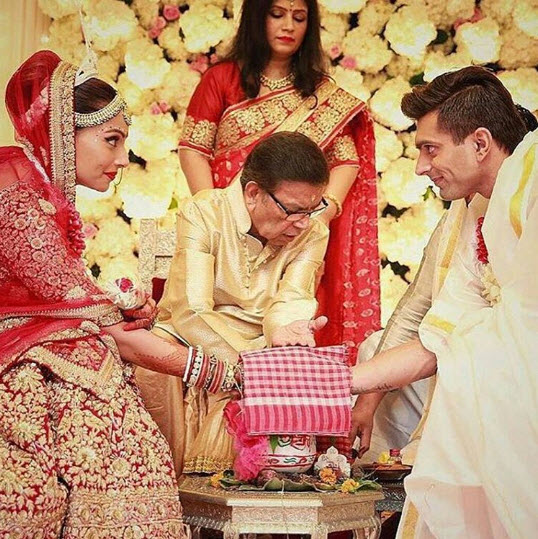
This ritual includes finding the right date for the wedding and other rituals. The priest checks the planetary positions and gives the right date and time. Elders from both the family meet along with the priest, select the date and exchange gifts or sweets as a part of the beginning.
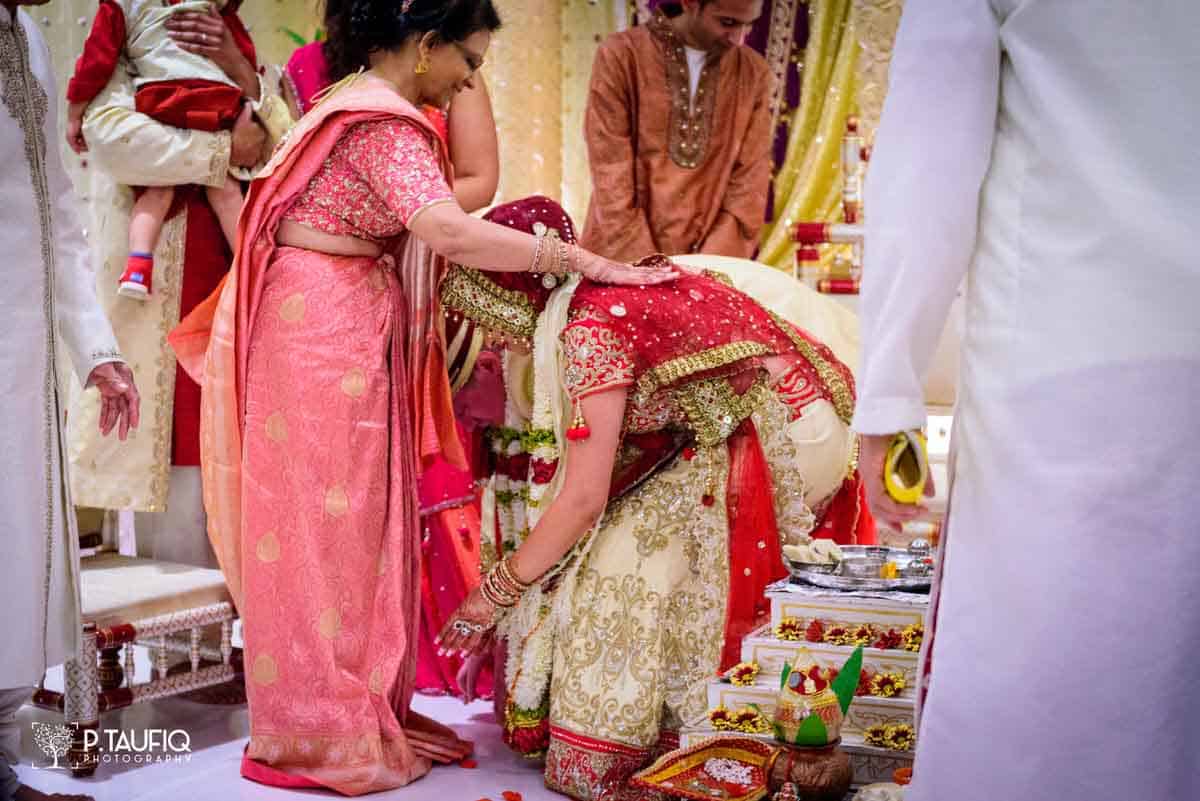
This ceremony is when the bride and the groom are accepted by their respective family members. Elders shower blessings to the groom and bride. As a part of the ceremony, elders put husked rice and trefoil leaves and present gold ornaments as a token of love. In many cases, this ritual takes place on the day of the wedding.
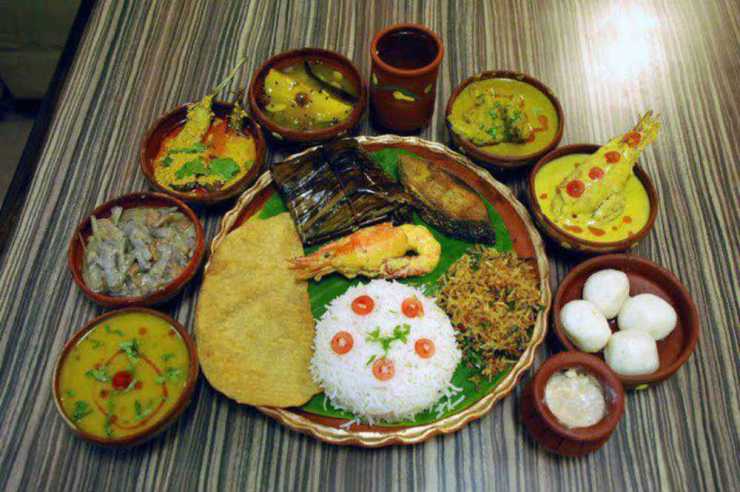
This is a party type ceremony, where friends, neighbors and close relatives meet at the bride or groom’s place and have fun. There is a platter of traditional Bengali food items served to guests. Songs, dance and other fun takes place to make the event memorable.
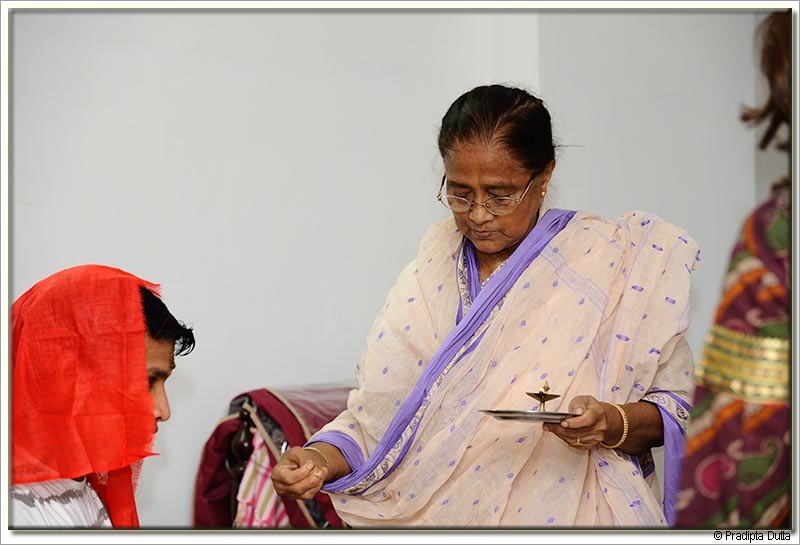
Image source- pbase.com
This ritual takes place in the morning of the wedding day, where both the families move in a procession to the nearby waterbody of River Ganges where they will collect some water to use it later during the snan ritual. The would-be couple will have curd, rice-flakes and other fasting items to eat. Elderly women of the house feed the bride or the groom. In areas of Bengal call this ceremony as Adhibas.
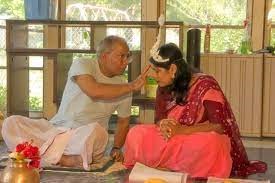
Image source- thephotoforum.com
Performed during the morning of the wedding, Nandi Mukh, before the “gaye holud” ceremony happens at the house of bride and groom. The priest chants some Vedic mantras and family members pay homage to ancestors. It is important to make ancestors happy before any such big events to seek their blessings.
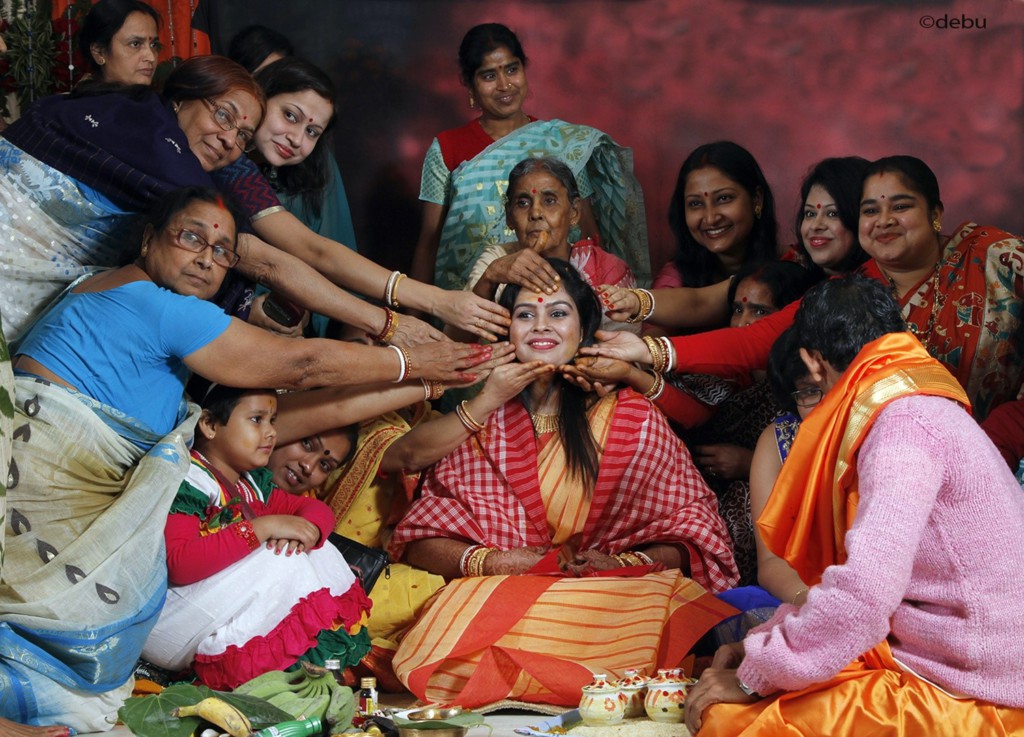
Image source- ePhotozine.com
On the morning of the wedding when the Nandi Mukh ceremony is finished, both families exchange Tattva- essential items for the wedding. The groom’s family comes along with the saree for the bride. Along with the saree, they bring oil, decorated carp and toiletry products for the bride. Both families give special attention to the decoration of the Tattva.
Then the ‘gaye holud’ ceremony takes place. Mehendi, in other words, is applied on the body of both bride and the groom. One done, they go and take snan.
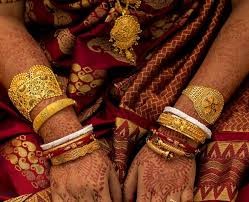
Image source- herzindagi.com
If you have seen Punjabi or any north Indian Wedding Rituals in which bride wearing conch shell bangles, then don’t be surprised seeing some Bengali girls wearing the same. On the day of ‘ai budo bhaat’, bride during the morning of the wedding day, they wear these red and white color bangles. White one are called Sankha, and the red ones are Pola.
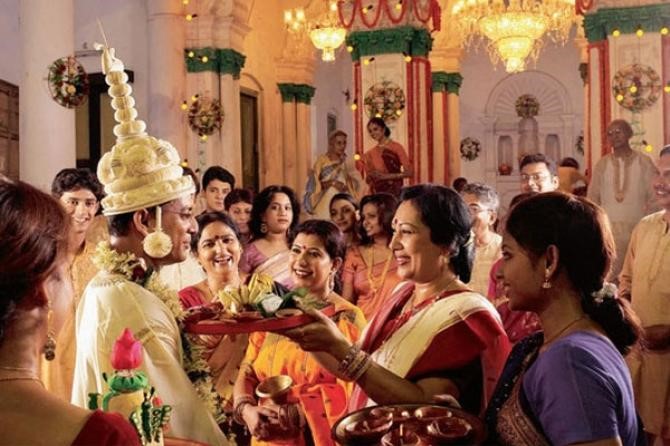
Image source- themandapsaga.wordpress.com
There is a specific time frame to conduct Bengali wedding rituals and is considered auspicious. Called as Lagna, the wedding procession from the groom’s side leaves for the venue in a car, sent by the bride’s family. The group or procession is called Bor Jatri. At the entrance of the venue, the bride family waits to receive the groom family arriving by dancing. In some weddings, the mother of the bride washes the car of the groom, anoints the groom’s forehead with a tilak from Baran Dala and welcomes with an aarti.
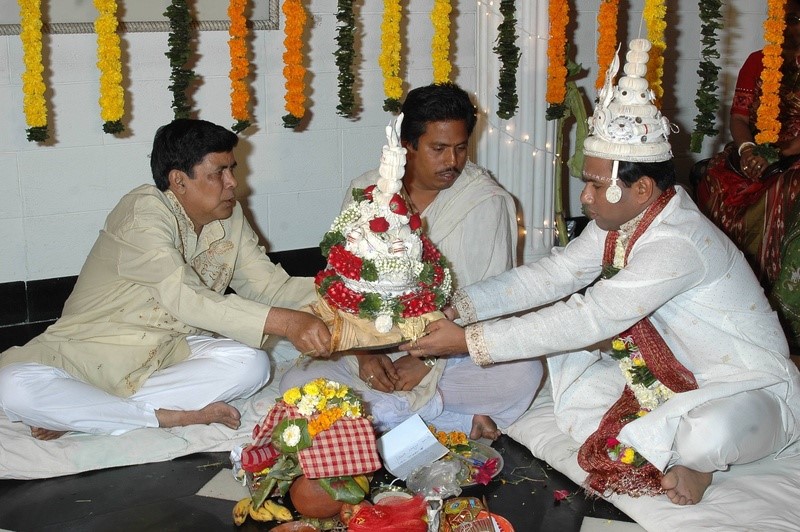
Image source- weddingz.in
The groom wears a pleated dhoti and kurta, seated on the chchadnatala basically a mandap where the wedding rites are performed. It is the place in which elders of the bride gifts the groom, do kanya dana for the bride and other such activities. The new cloth gifted to the groom is called as ‘potto bostro’
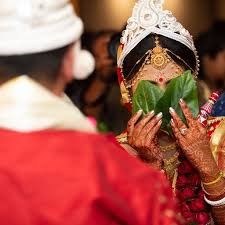
Image source- theweddingbrigade.com
This is the most priceless moment of the wedding day when the bride enters the mandap where the groom is always following the rituals along with the priest. However, the bride doesn’t walk straight to the mandap, instead she is being carried by her brothers and close male relatives, while she is sitting on the pidi and carrying her around the groom for seven times. Throughout this process, the bride covers her eyes with two betel leaves, and once the Saat Paak ends, she uncovers her eyes and looks at the groom. This is called the Subhi Drishti.
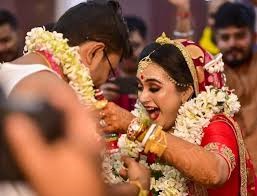
Image source- theweddingbrigade.com
Exchanging the garland takes place while the bride sits on the pidi, carried by her brother. The exchange of garland takes place for three times signifies that they accept each other. However, for the groom it’s a challenge to reach the bride’s neck, as her brother keeps lifting her up. This is the most fun scene to watch for and the groom too gives the bride a challenge to wear the garland.
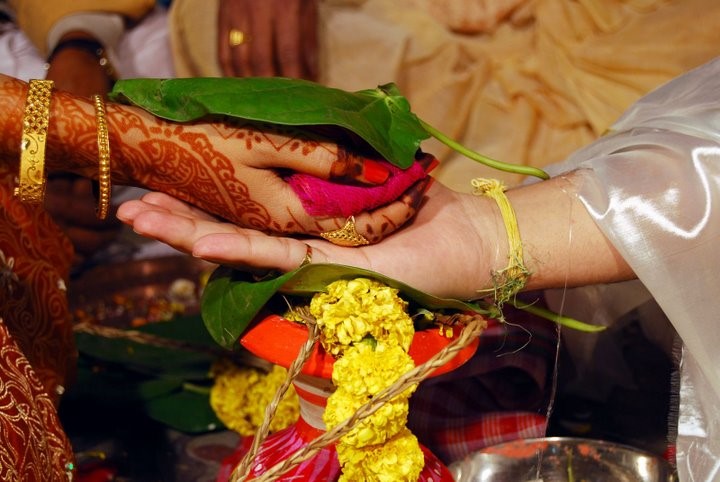
Image source- trekearth.com
Elderly members of the bride extend the hands of the bride to the groom. Their hands get tied with a sacred thread until the rituals are finished. This entire ceremony is called the Sampradan.
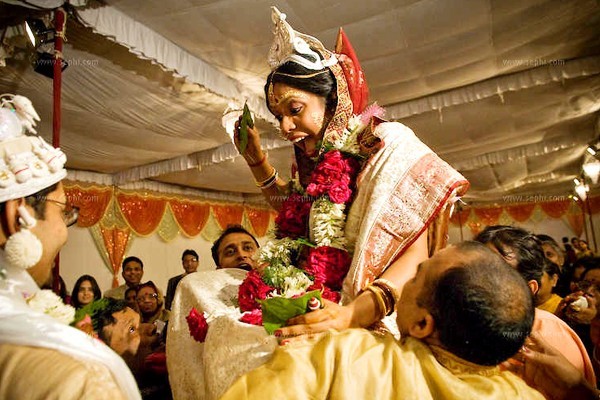
Image source- weddingplz.com
In the presence of Agni Dev or the Fire God, the priest reads the chant mantra, and the couple sits following the instructions of the priest.
During this, the couple walks around the pyre for seven times. The ‘uttariya’ worn by the groom and the end part of the bride saree is tied up during this round. The entire process is called as the ‘saat paak’
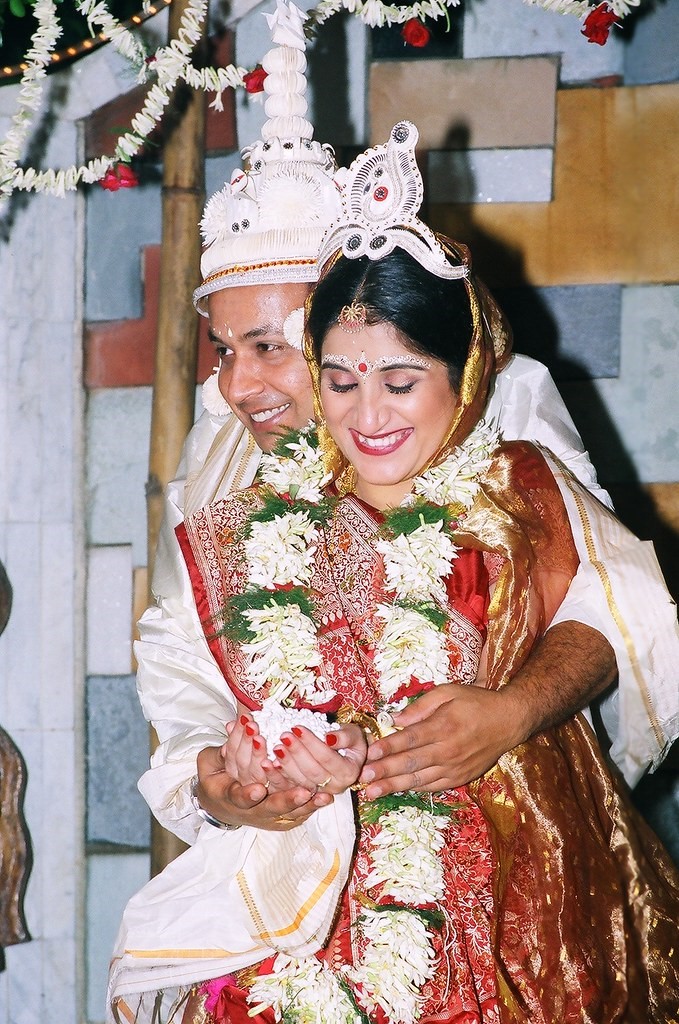
Image source- flickr.com
The brother of the bride gives puffed rice in her hands and both the couple offer the same to the sacred pyre. In many Bengali wedding rituals, the groom stands behind the bride, and both offer the rice on the pyre. This is known as Kusumdinge.
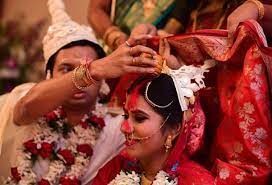
Image source- fnpgardens.com
The groom takes a pinch of vermilion mark and puts it on the forehead of the bride. This is the final of all Bengali wedding rituals.
On the night after the wedding, all the extended family members dance, sing and have fun. In many homes, members play games to have a fun wedding night.
The next day after the wedding, Bashi Biye is performed. However, only close relatives are present to perform a puja.
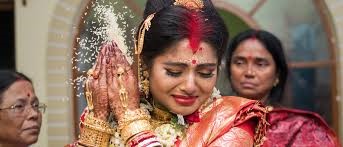
Image source- paperplanesphotography.com
Bidaay or in Hindi Bidaai is the process when the bride leaves her family home with a heavy heart to a new home and to set a new life. During this process, the bride throws fistfuls of rice backwards and keeps moving forward.
Once the groom and the bride arrive at the groom’s house in a car, the mother of the groom washes the car tyres and brings in the bride. Called as Bodhu Baran, the imprints of the bride’s legs lead until she enters the home.
The first night of post-wedding both the bride and the groom sleep in the different rooms. According to the legends, if the both sleep together on the first night, the marriage won’t last long.
On the first day of the post-wedding is when the bride cooks some delicacies and serves it to elders. Also called the Bou-Bhaat, on this day, the husband hands over the saree along with the plate of the food to his wife, which states handing over the responsibilities for the rest of the life.
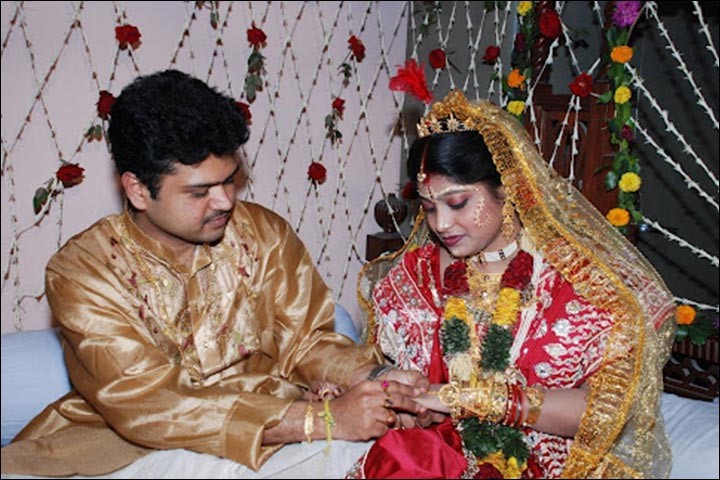
Image source- thebridalbox.com
On this day, i.e. the second day of the wedding, the newly-wed couple sleeps together in the room decorated with flowers.
This auspicious puja is offered to the Lord Satyanarayan to bless the couple and the family of both sides.
On the eight day post-marriage, the couple visits the bride’s home for lunch and spends some time with the family.
Hereby, the Bengali wedding rituals are complete. Although these rituals are quite long- carried for three days or more, it is the most happening thing to watch and enjoy. Relatives and friends need to save some time to take part in these rituals and make it memorable.